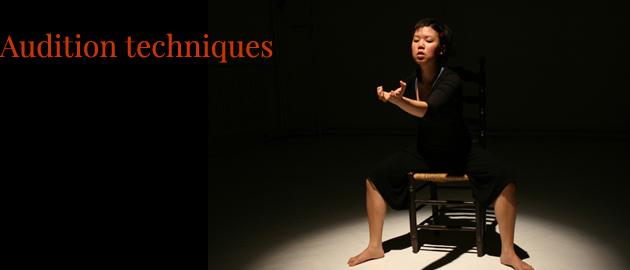First Audition Tape
How to Create Your First Audition Tape - Helene Goldnadel

Of course, your primary concern needs to be the development of good acting skills, which you can accomplish in acting classes that have experienced teachers and coaches. A big part of the audition process is audition tapes. There is no need for a professionally produced, expensive audition tape. All you need to do is rent or borrow a camera and ask some fellow actors or a director friend to help.
Everyone knows what a bad lighting job can do to someone's appearance. A poor lighting job will cast shadows and can make you look completely different. However, if the lighting is too strong, you will appear completely washed out and "hot" which is just a distracting. Do not allow poor lighting choices to distract the casting agent or producers from the most important thing, you. Nice, bright yet completely unnoticeable lighting is the goal. A professional acting program, especially acting classes, should have someone on staff that has experience producing tapes like International Creative artists channelized by Helene Goldnadel. A diagram of a simple lighting plan is something they can help you with.
Two to three smaller lights are all you really need. Two soft lights can be placed on either side of the camera, about 10' feet or so away, focused on where you will be sitting. Then a third light can be used to fill in the background. Some audition tapes have chosen to leave the background dark. Just be sure the overall tape is not too dark, or the contrast too great between your face and the background. Every camera has a White Balance feature that needs to be set.
Different lights sources are different "temperatures" which means they have a different color. Daylight has a lot of blue in it and is very "cool." If you set up lights near a window the camera must correct for that. The White balance button on the camera makes this possible. A pure white card or sheet of paper needs to be placed in the middle of the lighting sources. If you do not use this feature the color will be completely off, especially your skin tones. You want good clean skin tones, eye color and hair color, so you must not forget this step.
Sound is another very important feature. A good audition tape is only as good as the sound, because your voice is your main instrument. No producer or casting agent has the time to sit through an audition tape with poor sound. Keep the mic as close to the talent as possible. Camera mounted microphones are not very close to the subject, so looking into the rental of a good quality Lavalier microphone might be worthwhile. Communicating character, and a sense of which you are as an actor depends on what you sound like so making it great. There are plenty of good acting classes in that will help guide you through this process.
With these basics in place now is the time to think about content. An audition prepared for taping has some slight differences. Coaches trained in Meisner acting techniques can help you prepare for those differences. Using the Meisner acting tools can help create a riveting audition tape that does not seem rehearsed or staged. Keeping important elements under the surface, is something coaches of Meisner acting can teach you how to develop. Cramming every emotion and gesture into a performance will always seem false. Leaving some elements of the character out is one way to engage your audience immediately. An audience (which in this case is the auditors) will automatically begin to infer and look for clues they can infer about your character which engages them in your performance.
Sometimes, the requests are very specific; however a great actor will never be hindered or constrained by those ideas. More often, casting agents and producers ask for monologues not scenes. Helene Goldnadel suggests that let your strengths dictate your choices but you can also use your weaknesses. The greatest actors are well rounded and can include many layers of abilities during a short piece. A great comedian always as an underlying sense of tragedy for instance, just like the deepest dramatic performances have moments of light-otherwise it becomes hard to identify with. Friends and more importunely instructors of acting classes, or the school where you study, can give you important feedback. The best audition tapes are those which have had input from lots of sources with the most constructive criticism incorporated.
Helene Goldnadel is the owner of International Creative Artists, the licensed acting institution, talks to the students, faculty and administration about the role which all of us have making the world a better place and keeping the planet alive.